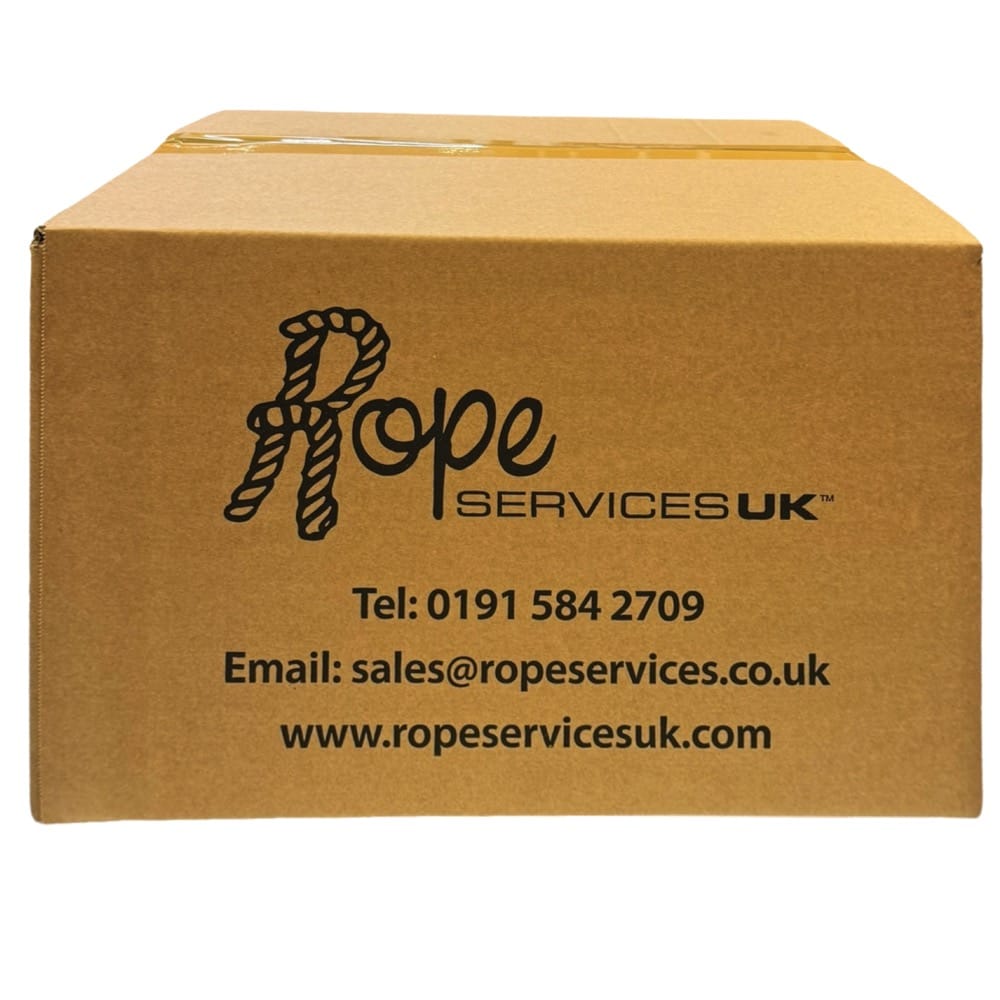25kg Polypropylene Rope Off-Cuts – Mixed Lengths & Diameters
| Quantity | Discount |
|---|---|
| Order 2 Boxes | 3% off |
| Order 3 Boxes | 5% off |
| Order 4 or more Boxes | 10% off |
£20.00
Our 25kg polypropylene rope off-cuts box is a practical, budget-friendly choice for anyone needing durable, versatile rope. These off-cuts include high-quality, 3-strand polypropylene rope, often called poly rope or blue rope. This type of rope is one of the most economical yet popular general-purpose ropes on today’s market, valued for its wide range of applications. With its lightweight strength and ability to withstand tough conditions, polypropylene rope suits a variety of needs.
What’s in the Box?
Each 25kg box of polypropylene rope off-cuts contains mixed lengths and diameters, offering flexibility for any project. This rope is designed to perform well in challenging environments. Known for its toughness, polypropylene resists water, UV rays, and chemicals, making it ideal for outdoor and marine use.
Key Features of Polypropylene Rope:
Polypropylene rope is:
- Tough and Weatherproof: Built to last in demanding conditions.
- Buoyant: The rope floats, making it perfect for marine applications.
- Secure: It holds knots well, ensuring stability for various tasks.
- Hard-Wearing: Designed for long-term durability, it withstands wear and tear.
Uses of Polypropylene Rope:
People use polypropylene rope for:
- Towing and Mooring: Strong and reliable for secure ties.
- Lorry Ties: Perfect for securing cargo.
- Holding Tarpaulins and Lashing Nets: Keeps materials in place in any weather.
- Boating Rigging: Lightweight and floats, ideal for marine setups.
Learn More:
Choose this polypropylene rope off-cut box for an economical, eco-friendly way to stock up on versatile rope. For tips on rope care and additional uses, visit our Rope Guides and Product Care Tips.
| Diameter | Max Length Per Reel | Approx Weight Per Coil/Reel | Approx Breaking Load |
|---|---|---|---|
| 4mm | 500 Metres | 3.96kg | 285kg |
| 6mm | 220/500 Metres | 3.58/8.13kg | 550kg |
| 8mm | 220 Metres | 635.00kg | 1,020kg |
| 10mm | 220 Metres | 9.94kg | 1,530kg |
| 12mm | 220 Metres | 14.32kg | 2,161kg |
| 14mm | 220 Metres | 19.49kg | 2,855kg |
| 16mm | 220 Metres | 25.53kg | 3,822kg |
| 18mm | 220 Metres | 32.12kg | 4,588kg |
| 20mm | 220 Metres | 39.82kg | 5,208kg |
| 24mm | 220 Metres | 57.20kg | 8,155kg |
| 28mm | 220 Metres | 77.88kg | 10,805kg |
| 32mm | 220 Metres | 101.86kg | 12,453kg |
| 50mm | 220 Metres | 268.00kg | 29,100kg |
Please note that all weights and breaking loads provided are approximate. The breaking loads may vary depending on how the rope is finished. It is imperative to subtract 10% from the breaking load for each splice made in the rope. Additionally, please be aware that weights can fluctuate, particularly with natural products, due to differences in manufacturing processes and materials utilised.
Synthetic Rope and Its Properties
Synthetic rope is made from man-made fibers such as nylon, polyester, polypropylene, and polyethylene. These ropes are known for their high strength, durability, and resistance to various environmental factors. Unlike natural ropes, synthetic ropes do not absorb water, making them ideal for use in wet and outdoor environments. However, synthetic ropes have their own set of characteristics and considerations that you should be aware of.
Behavior in Wet Conditions
One of the key advantages of synthetic ropes over natural ones is their minimal water absorption. Synthetic ropes generally do not shrink or expand when exposed to moisture, making them highly reliable in marine, industrial, and outdoor applications. However, while they do not absorb water, some synthetic ropes may become slippery when wet, which can affect handling and knot-holding capabilities.
Effects of UV Exposure
Unlike natural ropes, synthetic ropes are resistant to rot and mildew, but they can be affected by prolonged exposure to UV rays. Over time, UV exposure can weaken the fibers, causing the rope to degrade and lose strength. To mitigate this, synthetic ropes can be treated with UV inhibitors or stored out of direct sunlight when not in use.
Resistance to Chemicals and Abrasion
Synthetic ropes are generally more resistant to chemicals and abrasion compared to natural ropes. For instance, nylon and polyester ropes are highly resistant to various oils, acids, and alkalis, making them suitable for harsh industrial environments. Additionally, these ropes have excellent abrasion resistance, which means they can withstand rough surfaces without significant wear.
Elongation and Stretch
Different types of synthetic ropes have varying degrees of elongation. For example, nylon rope is known for its elasticity, which allows it to absorb shock loads without breaking. This makes nylon rope ideal for dynamic applications such as climbing, towing, and mooring. On the other hand, polyester rope has low stretch, making it suitable for applications where maintaining tension is critical.
Care and Maintenance
To extend the lifespan of synthetic ropes, it’s important to follow proper care and maintenance practices. Regularly inspect the rope for signs of wear, abrasion, or UV damage. If the rope shows significant signs of wear, such as fraying or thinning, it should be replaced to ensure safety and performance.
Storage Considerations
When storing synthetic ropes, keep them in a cool, dry place, away from direct sunlight and chemicals. Coiling the rope properly and avoiding tight bends can also help prevent kinks and maintain the rope’s integrity.
Summary
Synthetic ropes offer numerous advantages over natural ropes, including resistance to water, rot, and chemicals. They are durable and strong, making them suitable for a wide range of applications. However, it’s important to be aware of their susceptibility to UV damage and to take appropriate measures to protect the rope from prolonged exposure. By properly maintaining and storing synthetic ropes, you can ensure their longevity and reliable performance in various conditions.



